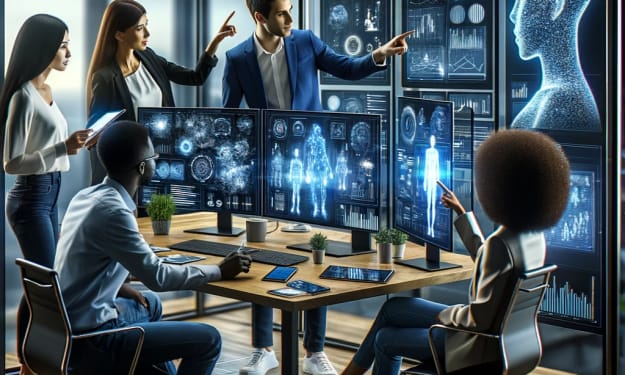
I. Introduction
Artificial intelligence (AI)
refers to the ability of machines to perform tasks that typically require human intelligence, such as perception, reasoning, learning, decision-making, and natural language processing. AI is an interdisciplinary field that combines computer science, engineering, mathematics, cognitive psychology, and linguistics.
The idea of AI dates back to ancient times, where the concept of creating artificial beings with human-like intelligence was a common theme in mythology and folklore. However, the actual development of AI as a scientific discipline began in the 1950s, with the creation of the first computer programs designed to simulate human reasoning.
Today, AI is widely used in various industries and applications, such as healthcare, finance, transportation, manufacturing, entertainment, and education. AI technologies can be categorized into several subfields, including machine learning, natural language processing, computer vision, robotics, and expert systems.
Machine learning is a subset of AI that involves the use of statistical algorithms and models to enable computers to learn from data, without being explicitly programmed. Machine learning algorithms can be divided into three main categories: supervised learning, unsupervised learning, and reinforcement learning.
Supervised learning involves training a machine learning model on labeled data, where the correct output is provided for each input example. The model learns to map inputs to outputs based on the patterns and relationships in the data. This approach is commonly used for tasks such as classification, regression, and prediction.
Unsupervised learning involves training a machine learning model on unlabeled data, where the algorithm must identify patterns and structures in the data without any guidance. This approach is used for tasks such as clustering, anomaly detection, and dimensionality reduction.
Reinforcement learning involves training a machine learning model to make decisions based on feedback from its environment. The model learns to maximize a reward signal by taking actions that lead to positive outcomes and avoiding actions that lead to negative outcomes. This approach is commonly used in robotics, gaming, and control systems.
Natural language processing (NLP) is another important subfield of AI, which involves the development of algorithms and models to enable computers to understand, interpret, and generate human language. NLP applications include language translation, sentiment analysis, text summarization, and speech recognition.
Computer vision is a subfield of AI that focuses on enabling machines to interpret and analyze visual information from the world around them. Computer vision applications include image recognition, object detection, face recognition, and video analysis.
Robotics is a subfield of AI that involves the design and development of machines that can interact with their environment and perform tasks autonomously. Robotics applications include industrial automation, autonomous vehicles, and drones.
Expert systems are another important subfield of AI that involves the development of computer programs that can mimic the decision-making abilities of human experts in a specific domain. Expert systems are used in fields such as medicine, finance, and engineering, where the knowledge of human experts is crucial for making informed decisions.
In recent years, AI has seen rapid progress and development, thanks to advances in hardware and software technologies, as well as the availability of large amounts of data. Some of the recent breakthroughs in AI include the development of deep learning algorithms, which enable machines to learn hierarchical representations of data, and the creation of generative models, which can generate new data that is similar to the input data.
AI has the potential to revolutionize many aspects of our lives, from healthcare and transportation to education and entertainment. However, it also raises ethical, social, and economic concerns, such as the impact on employment, privacy, and safety. Therefore, it is important to approach the development and deployment of AI technologies with caution and responsibility, and to ensure that the benefits are shared equitably across society.
Artificial intelligence (AI) refers to the ability of machines to perform tasks that typically require human intelligence, such as visual perception, speech recognition, decision-making, and language translation. The concept of AI has been around since the mid-20th century, but it has only recently gained significant traction due to advancements in computing power and data availability. Currently, AI is being used in a wide range of applications, including voice assistants, self-driving cars, fraud detection, and medical diagnosis.
AI in the near future
In the near future, we can expect AI to continue to make significant advancements in natural language processing. This will lead to more sophisticated voice assistants that can understand and respond to natural language queries more accurately. In addition, AI will continue to increase automation in various industries, from manufacturing to finance. This will lead to increased efficiency and productivity, but it will also have an impact on employment. Finally, AI will lead to more personalized experiences for individuals, as algorithms become better at predicting and catering to individual preferences.
AI in the mid-future
In the mid-future, we can expect AI to make significant advancements in machine learning algorithms. This will lead to more sophisticated predictive models that can learn from vast amounts of data and make more accurate predictions. We can also expect AI to become more integrated into everyday life, with smart homes, cities, and transportation systems becoming more prevalent. However, this integration will also lead to concerns about privacy and security. Finally, AI will have a significant impact on employment, with many jobs becoming automated and new jobs being created that require new skills.
IV. AI in the far future
In the far future, we can expect AI to make significant advancements in surpassing human intelligence. This will lead to machines that can perform tasks that are currently beyond human ability, such as developing new scientific theories and discovering new drugs. However, this will also raise ethical and safety concerns, as machines with superhuman intelligence could potentially pose a threat to humanity. At the same time, AI could also be used to solve major global issues such as climate change and disede
Conclusion
Overall, AI has the potential to revolutionize many aspects of our lives, from the way we work to the way we live. While there are concerns about the impact of AI on employment and society as a whole, there are also significant benefits to be gained. As we continue to develop and refine AI technology, it will be important to ensure that we are using it for the greater good and addressing any ethical concerns that arise. The future of AI is uncertain, but one thing is clear – it will continue to be a major force in shaping our world in the years to come.
About the Creator
CRICKET ONLY
Cricket Related News And Posts.
- Cricket updates of upcoming International, domestic and T20 matches.
- Catch all the latest news about cricket on Cricket Only.






Comments
There are no comments for this story
Be the first to respond and start the conversation.